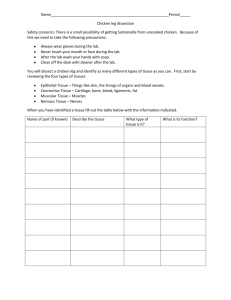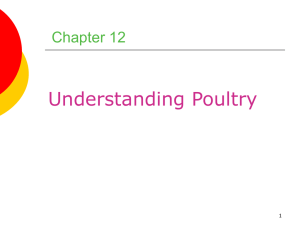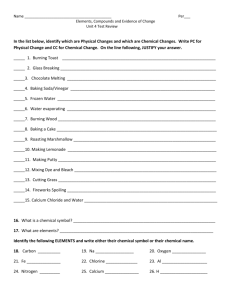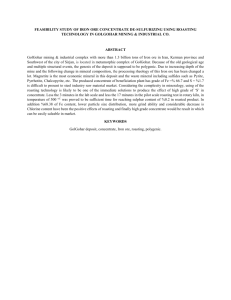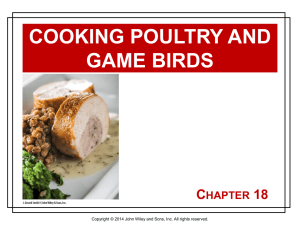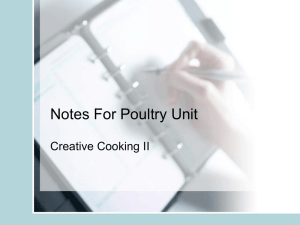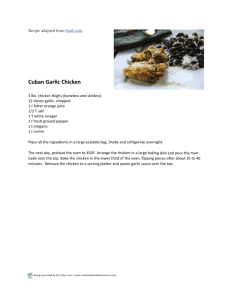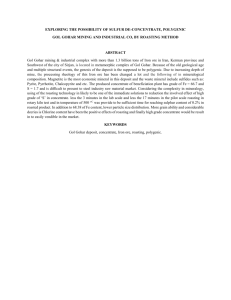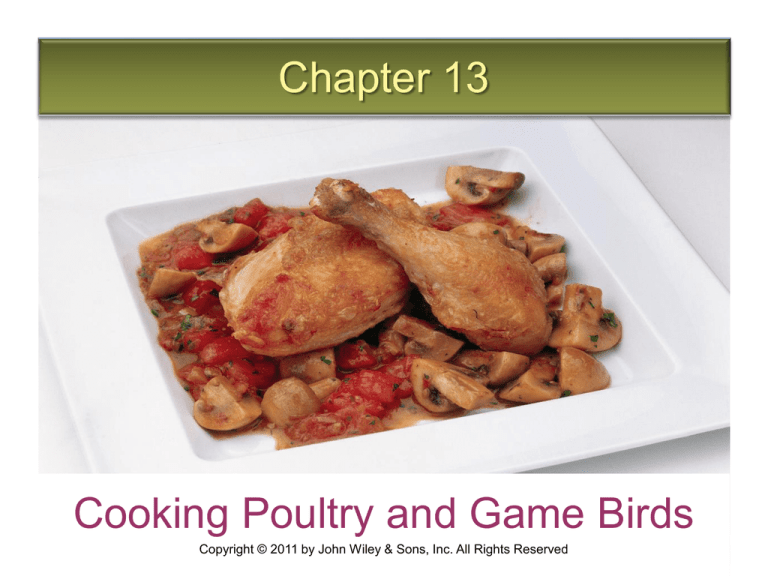
Chapter 13
Cooking Poultry and Game Birds
Copyright © 2011 by John Wiley & Sons, Inc. All Rights Reserved
Roasting and Baking
Seasoning and Basting
• Remember that poultry items are almost always
cooked well done (except for squab and game
birds).
• Seasonings and, if desired, a little mirepoix or a
bouquet garni should be placed inside the
cavity.
2
Roasting and Baking
Seasoning and Basting
When roasting whole
birds:
• Season the skin only if it
is to be served and
eaten.
• Seasonings will not
penetrate the skin.
3
Roasting and Baking
Seasoning and Basting
• Oil the skin before roasting to help in browning
and to protect against drying.
• Skin may be basted with fat during roasting.
• This is unnecessary if the bird is roasted breast
down (and turned breast up just at the end of the
roasting period to brown).
4
Roasting and Baking
Seasoning and Basting
Basting is beneficial for large turkeys.
• Baste every 20 to 30 minutes.
• Too frequent basting results in the loss of a great deal
of heat from the oven due to frequent door opening.
5
Roasting and Baking
Temperature
• Low-temperature roasting is best for large
items, such as turkeys and capons.
• Large turkeys may be roasted at 250° to 325°F (120°
to 165°C).
• It is not advisable to roast at very low
temperatures.
• The interior temperature will take too long to rise,
providing a good breeding ground for bacteria.
6
Roasting and Baking
Temperature
• Smaller items, such as roasting chickens, are usually
roasted at 325° to 375°F (165° to 190°C).
• The searing method may be used for chickens under 4
to 5 pounds (2 kg) and for baked chicken parts.
• Begin roasting in the oven at 450°F (230°C) for 15 minutes.
• Then reduce the oven temperature to 250° to 325°F (120° to
160°C).
7
Roasting and Baking
Temperature
Ducks and geese may be started at a high
temperature in order to:
• Melt off some of the heavy fat layer under the skin.
• Make the skin brown and crisp.
8
Roasting and Baking
Baked Poultry
• Roasting and baking are the same process.
• Baked chicken or turkey parts are treated like
roasted poultry.
9
Roasting and Baking
Poêlé
Poêlé is a classical preparation
for white meats and poultry in
which the item is:
• Cooked with a matignon
• See sidebar on page 398
• In a covered container.
• Basted with butter before and during
cooking.
• Because the container is covered, the
procedure is not a dry-heat method.
Therefore, it is not a genuine roasting
10
procedure.
Roasting and Baking
Carving Roast Chicken
Place the chicken on a clean,
sanitary cutting board. Cut
through the skin between the leg
and the breast sections.
Pull the leg away from the body
of the chicken with the fork.
Using the knife, cut between the
thigh bone and the hip to
separate the leg completely. 11
Roasting and Baking
Carving Roast Chicken
Hold the chicken steady by
bracing the backbone with the
fork. Cut through the breast
between the two halves, just to
one side of the keel bone.
Pull the breast section away from the
bone. With the knife, cut through the
joint where the wing bone is attached
to the body. Separate the breast and
wing section completely from the
carcass. Repeat steps on the other
12
side of the chicken.
Roasting and Baking
Carving Roast Chicken
Cut the wings from the breast portions and cut
the drumsticks apart from the thighs.
13
Roasting and Baking
Carving a Turkey
Place the turkey on a clean, sanitary cutting board. Cut through
the skin between the leg and the body. Pull the leg outward with
a fork. The leg should pull off easily, but use the knife as
necessary to separate the thigh from the hip.
14
Roasting and Baking
Carving a Turkey
Cut the drumstick and thigh
apart at the joint. Repeat with
the other leg.
Cut the meat from the drumstick
and thigh in thin slices.
15
Roasting and Baking
Carving a Turkey
With long, smooth strokes, cut
the breast into thin slices.
When the slices become too
large, change the angle of the
knife slightly as shown.
16
Roasting and Baking
Carving a Turkey
An alternative method is to cut off an entire half-breast in one
piece. This piece can then be sliced as shown. Cut across the
grain, holding the knife at an angle to get broader slices.
17
Broiling and Grilling
• Use lower temperatures than for meats.
• Poultry skin, in particular, browns and then burns very easily.
• For quantity production, broiled chicken is sometimes
finished in the oven on sheet pans.
• Start poultry pieces skin side down.
• Brush generously with melted
butter or other fat before and
during broiling.
• Large or thick poultry items
are not well-suited to broiling
and grilling.
18
Broiling and Grilling
Give variety to grilled poultry
• Marinate the poultry or rub it with seasonings before cooking.
• Baste with seasoned butter, marinade, or other flavorings during
broiling.
• Serve with an appropriate sauce or seasoned butter.
• Select vegetable garnishes for variety and interest.
19
Sautéing, Pan-Frying &
Deep-Frying
Sautéing
Quick-cooking items are ideal for sautéing.
• Larger items, such as bone-in chicken cut into eighths,
are harder to cook to doneness by sautéing.
• Brown by sautéing then finish by another method, such as
baking or braising.
• On the other hand, breasts of game birds may be
cooked rare or medium, start to finish, on the stovetop.
20
Sautéing, Pan-Frying &
Deep-Frying
Pan-Frying
Pan-fried chicken is usually breaded or floured
before cooking for even browning and
crispness.
• About ¼ inch (½ cm) or more of fat is needed in the pan
to pan-fry chicken.
• The presentation side is usually the skin side.
• Should be browned first for best appearance.
21
Sautéing, Pan-Frying &
Deep-Frying
Deep-Frying
• Fry chicken at 325° to 350°F (160° to 175°C)
for even cooking.
• Pieces from small chickens (under 2½ lbs) are
best for deep-frying.
• If necessary, fried items may be finished in the oven.
22
Simmering and Poaching
Simmering
Used to cook fowl and other tough items that
require long cooking in moist heat to be made
tender.
• Cooking liquid is usually water seasoned with salt,
mirepoix, and herbs.
• Simmered fowl yields a rich, flavorful broth.
• For more flavorful soup, start the fowl in cold water.
• For more flavorful meat, start with hot water.
23
Simmering and Poaching
Poaching
Used to gently cook tender poultry.
• Cooking time is usually short because the product is
naturally tender.
• The cooking liquid is usually stock, wine, and other
flavorings and seasonings.
• The liquid may be used to make a sauce.
• Drain the poultry well after cooking.
• Poaching may be done on the rangetop or in the oven.
24
Simmering and Poaching
Braising
May be used to:
• Tenderize tough
poultry products.
• Provide moistness
and flavor to tender
poultry items.
25
Dressings and Stuffings
Stuffing chickens and turkeys is usually not
practical in production kitchens.
• Baking the stuffing separately gives better results for
these reasons:
1.
Safety
• Stuffing inside a bird is an ideal breeding ground for bacteria that
cause food poisoning.
2.
Quality
3.
Efficiency
26
Dressings and Stuffings
Dressings
Basic Ingredients
1. Starch base
•
Such as bread or rice.
2. Aromatic vegetables
•
Generally onions and celery.
3. Fat
•
Butter or chicken fat.
•
Used for sautéing the vegetables and for providing richness.
27
Dressings and Stuffings
Dressings
Basic Ingredients (cont’d)
4. Liquid
•
Usually stock, to provide moisture.
5. Seasonings, herbs, and spices
6. Eggs
•
Sometimes added as a binder.
•
Not always necessary.
28
Dressings and Stuffings
Dressings
Basic Ingredients (cont’d)
7. Other ingredients for flavor, character, and bulk:
• Sausage
• Chestnuts
• Oysters
• Fruits
• Giblets
• Nuts
29
Recipe Pronunciations
• Chicken Poêlé
(p.398)
• Poulet à la Diable
• Chicken Paillard
(p.400)
with Grilled Vegetables (p.401)
• Grilled Ostrich or Emu with Adobo
• Chicken Blanquette
• Oyako
Donburi
• Mole Poblano
Spices (p.404)
(p.422)
(p.423)
de Pollo or de Guajolote
(p.426)
30
Recipe Pronunciations
• Fricassée
Argenteuil
• Chicken Bercy
(p.428)
(p.429)
• Chicken Portugaise
(p.429)
• Chicken Hongroise
(p.429)
• Chicken alla Cacciatora
• Coq au Vin
(p.434)
• Arroz con Pollo
• Duck Confit
(p.431)
(p.435)
(p.437)
31

